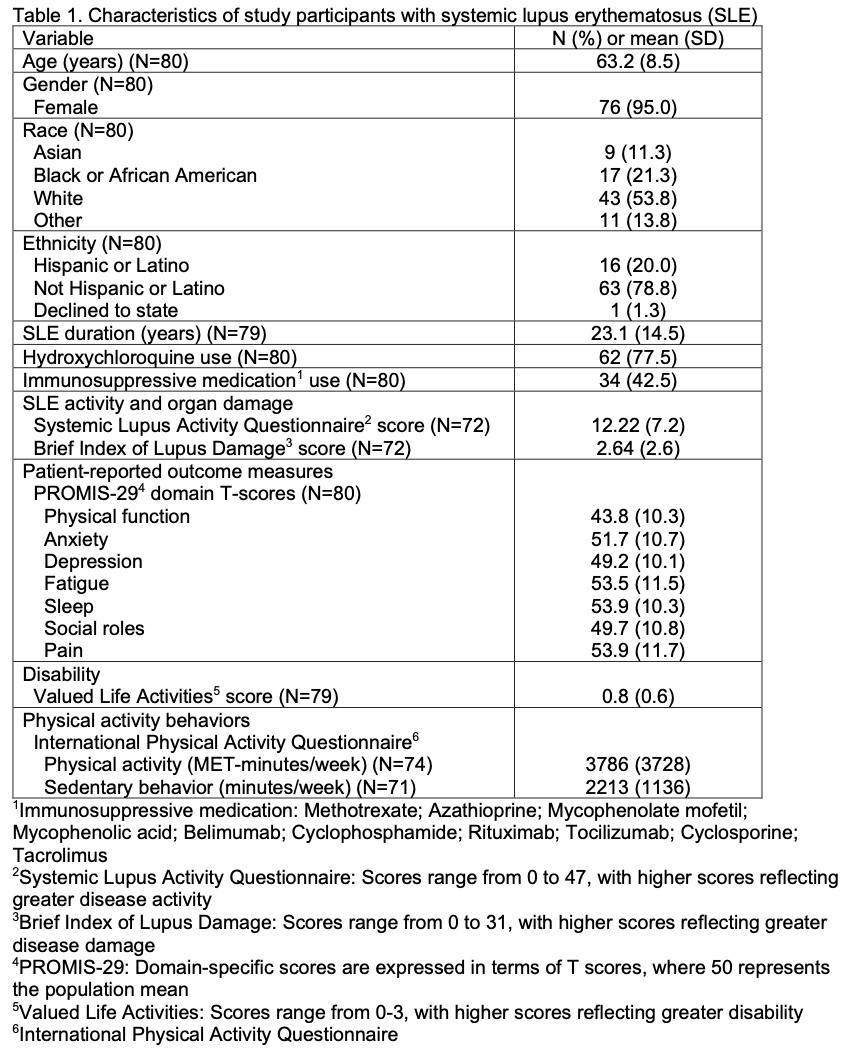Session Information
Date: Tuesday, October 28, 2025
Title: (2377–2436) Systemic Lupus Erythematosus – Diagnosis, Manifestations, & Outcomes Poster III
Session Type: Poster Session C
Session Time: 10:30AM-12:30PM
Background/Purpose: The benefits of physical activity are well established in older adults in the general population. Among older adults with rheumatic and musculoskeletal diseases, including systemic lupus erythematosus (SLE), physical activity has been associated with improved health-related quality of life [1]. However, the extent to which this relationship may be similar for sedentary behavior or impacted by SLE disease severity is not well understood. We sought to characterize the association of physical activity and sedentary behavior with patient-reported outcome measures and self-reported disability in middle-aged and older adults with SLE.
Methods: Adults ≥50 years with validated SLE were enrolled in a single-center cross-sectional study. Sociodemographic and disease features were self-reported. Patient-reported outcomes, disability status, and physical activity and sedentary behavior were ascertained using PROMIS-29, Valued Life Activities, and International Physical Activity Questionnaire surveys, respectively. Associations between physical activity and sedentary behavior and health-related quality of life domains were assessed using linear regression and adjusted for age, race, ethnicity, SLE duration, and SLE disease activity and organ damage.
Results: Participants (Nf80) were primarily female (95.0%) with mean age and SLE duration of 63.2 (standard deviation [SD]=8.5) and 23.1 (SD=14.5) years, respectively. Physical activity was associated with multiple health-related quality of life domains in unadjusted analyses, but after adjustment for covariates, only the association of physical activity with fatigue (ß coefficient -206.74, 95% confidence interval [CI] [-337.11, -76.36], p < 0.01) and social roles (ß coefficient 253.42, 95% CI [127.12, 379.72], p < 0.01) remained significant. Sedentary behavior was not significantly associated with any aspect of health-related quality of life pre- or post-covariate adjustment.
Conclusion: In this cross-sectional study of middle-aged and older adults with SLE, physical activity was associated with less fatigue and greater social engagement. Physical activity may have favorable effects on fatigue and social engagement in this growing population of patients.Reference:1. Kumthekar A et al. J Rheumatol 2023;50(6):835-41.
 Table 1. Characteristics of study participants with systemic lupus erythematosus (SLE)
Table 1. Characteristics of study participants with systemic lupus erythematosus (SLE)
.jpg) Table 2. Unadjusted cross-sectional associations of physical activity and sedentary behavior with health-related outcomes in middle-aged and older adults with systemic lupus erythematosus
Table 2. Unadjusted cross-sectional associations of physical activity and sedentary behavior with health-related outcomes in middle-aged and older adults with systemic lupus erythematosus
.jpg) Table 3. Adjusted* cross-sectional associations of physical activity and sedentary behavior with health-related outcomes in middle-aged and older adults with systemic lupus erythematosus (SLE)
Table 3. Adjusted* cross-sectional associations of physical activity and sedentary behavior with health-related outcomes in middle-aged and older adults with systemic lupus erythematosus (SLE)
To cite this abstract in AMA style:
Lieber S, Nagpal N, Nguyen J, Chung A, Sun D, Navarro-Millan I, Reid M, Mandl L. Physical Activity Patterns and Health-Related Quality of Life in Middle-Aged and Older Adults with Systemic Lupus Erythematosus [abstract]. Arthritis Rheumatol. 2025; 77 (suppl 9). https://acrabstracts.org/abstract/physical-activity-patterns-and-health-related-quality-of-life-in-middle-aged-and-older-adults-with-systemic-lupus-erythematosus/. Accessed .« Back to ACR Convergence 2025
ACR Meeting Abstracts - https://acrabstracts.org/abstract/physical-activity-patterns-and-health-related-quality-of-life-in-middle-aged-and-older-adults-with-systemic-lupus-erythematosus/
